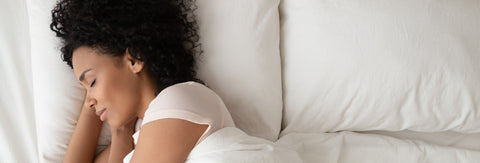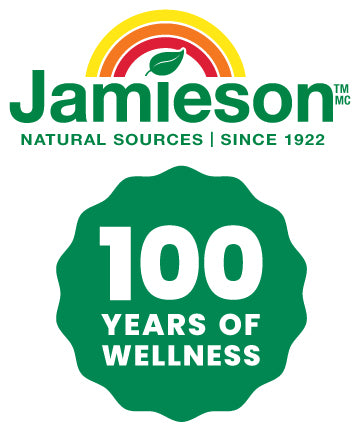Sleepless nights can happen to the best of us. In fact, 25% of Canadians have trouble falling or staying asleep most or all of the time.1 And if you’ve ever struggled - tossing, turning, and feeling the minutes crawl by – you’re probably no stranger to the many kinds of sleep aids and tactics. From counting sheep, meditating, reading, warm showers, and electronic bans to taking supplements, there is no shortage of solutions in hopes of a restful slumber.
Melatonin, the hormone that helps us fall asleep and stay asleep, is naturally produced by the brain. It is also available as a supplement. Though it is a widely accepted sleep solution found at many bedsides, beneath the surface swirl many myths and misconceptions about this natural sleep enhancer. Let’s dive into the world of sleep and science, and dispel the most common myths about melatonin supplements.
Myth #1: Melatonin is a sedative
Many people believe that a melatonin supplement will immediately induce sleep, but this couldn’t be further from the truth. Melatonin is a naturally occurring hormone that’s produced in the brain to help regulate your sleep-wake cycle. It signals tiredness to the body and helps it prepare for sleep, rather than directly putting you to sleep like an actual sedative would.
Myth #2: More is better
The truth is, there is a unique dose for each person, ranging from 1 mg to even 10 mg. Many variables can determine what dose of melatonin will help you sleep better, like weight and age. Research in older adults found that the optimal dose for melatonin could be anywhere from 1 mg to 6 mg.2 So, how can you find your dose? You can find your individualized dose with the help of Jamieson’s Sleep Spray, which provides 1 mg of melatonin per spray. By experimenting and trialing different doses, it can help you find the exact dose you need for more restful sleep!
Myth #3: You will become dependent
Melatonin is a naturally occurring hormone, released by the brain every night, making it difficult for the body to become dependent on it. Current research also backs this u p.3 Taking a melatonin supplement doesn’t cause you to need more and more as time goes on, which is a hallmark of dependence.3 Also, there are no cravings or withdrawal symptoms if you were to stop taking it.3
Myth #4: Supplementation stops natural production
Research on this topic proves otherwise. One study gave participants a melatonin supplement for 7 nights and measured natural melatonin production on the 8th night, which proved to be unchanged.4 Another trial used melatonin supplementation for 37 days and saw no change in the brain’s natural melatonin production.4
Myth #5: It's only for sleep
Increasingly, scientists are exploring the diverse health benefits of melatonin beyond its well-known role in sleep regulation. has found to play a role in female reproduction, specifically in having a positive impact on egg quality.5 Melatonin is becoming a well-known, potent antioxidant.6 Antioxidants combat oxidative stress and prevent free radicals from damaging cells. Researchers are applying this knowledge in areas of high antioxidant needs. For instance, scientists found melatonin supplementation in athletes to be effective in preventing excessive muscle damage. Melatonin is also becoming well-known for its anti-aging properties. Topically, studies have found melatonin-based creams to help improve skin tone, hydration and roughness in aging skin.8
References:
- Clayborne ZM, Dopko RL, Wang C, Betancourt MT, Roberts KC, Capaldi CA. Associations of sleep duration and sleep quality with indicators of mental health among youth and adults: findings from the 2015 Canadian Community Health Survey. Health Promot Chronic Dis Prev Can. 2023;43(5):243-59. https://doi.org/10.24095/hpcdp.43.5.04
- Pierce, M., Linnebur, S. A., Pearson, S. M., & Fixen, D. R. (2019). Optimal Melatonin Dose in Older Adults: A Clinical Review of the Literature. The Senior care pharmacist, 34(7), 419–431.
- Herndon, J. (2018a, July 20). Is melatonin addictive: Side effects, dosage, benefits, and depression. Healthline. https://www.healthline.com/health/is-melatonin-addictive#dosage
- Matsumoto, M., Sack, R. L., Blood, M. L., & Lewy, A. J. (1997). The amplitude of endogenous melatonin production is not affected by melatonin treatment in humans. Journal of pineal research, 22(1), 42–44. https://doi.org/10.1111/j.1600-079x.1997.tb00301.x
- Espino, J., Macedo, M., Lozano, G., Ortiz, Á., Rodríguez, C., Rodríguez, A. B., & Bejarano, I. (2019). Impact of Melatonin Supplementation in Women with Unexplained Infertility Undergoing Fertility Treatment. Antioxidants (Basel, Switzerland), 8(9), 338. https://doi.org/10.3390/antiox8090338
- Reiter, R. J., Mayo, J. C., Tan, D. X., Sainz, R. M., Alatorre-Jimenez, M., & Qin, L. (2016). Melatonin as an antioxidant: under promises but over delivers. Journal of pineal research, 61(3), 253–278. https://doi.org/10.1111/jpi.12360
- Roberto C. Leonardo-Mendonça, Javier Ocaña-Wilhelmi, Tomás de Haro, Carlos de Teresa-Galván, Eduardo Guerra-Hernández, Iryna Rusanova, Marisol Fernández-Ortiz, Ramy K.A. Sayed, Germaine Escames, and Darío Acuña-Castroviejo. The benefit of a supplement with the antioxidant melatonin on redox status and muscle damage in resistance-trained athletes. Applied Physiology, Nutrition, and Metabolism. 42(7): 700-707. https://doi.org/10.1139/apnm-2016-0677
- Milani, M., & Sparavigna, A. (2018). Antiaging efficacy of melatonin-based day and night creams: a randomized, split-face, assessor-blinded proof-of-concept trial. Clinical, cosmetic and investigational dermatology, 11, 51–57. https://doi.org/10.2147/CCID.S153905




